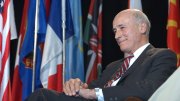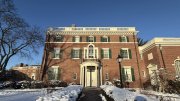Many of Harvard's leading humanities scholars convened on October 22 to celebrate the twentieth anniversary of the Humanities Centerand to plot their course through a changing academic landscapeby joining across disciplines for "20/20: Looking Back, Looking Forward," a conference aiming to reassert their disciplines' value at the University. The event included three panels of senior faculty members and centered on a lunchtime discussion led by center director and Kenan professor of English and American literature Marjorie Garber and professor of English and American literature Louis Menand. Facing the portraits of academic giants that line the Barker Center's wood-paneled Thompson Room, Garber and Menand asked: "Is it time to rebuild the humanities?"
 |
| Louis Menand and Marjorie Garber |
| Photograph by Stu Rosner |
Menand, who called himself the "negatively charged particle" in the exchange, indicated some pitfalls in the path the humanities are presently following at Harvard and its peer institutions. He focused in particular on what he felt to be a growing misunderstanding between universities and the nonacademic communitytypified, he said, by an apparently dis missive New York Times obituary of Jacques Derrida that had ruffled the feathers of scholars across the country. "I'm one of those people who reads the paper every morning and feels as though I'm living in the Dark Ages," Menand explained, referring to the state of current events. "I am one of those who thinks that the contribution humanists can make to culture...has never been more important."
Menand diagnosed six points of weakness in the current academic role of the humanities. Many prominent scholars who waged intellectual battles against traditionalists in their youth, he said, currently suffer from a "Greatest Generation syndrome": complacency at the prospect of continued change. This problem, he suggested, is more broadly related to "Turk death" in the humanities. "A critical field requires young Turks," Menand said, "and it's often difficult to see them on the horizon." He also mentioned "paradigm fatigue"a sense that many academics have become one-trick ponies in their workas a blow to scholars' appeal both inside and outside the university.
But Menand centered his discussion on what he called "reproductive issues": the system of graduate education that supports fledgling scholars. Finishing a humanities doctorate at American universities takes an average of eight and a half years, he said, and about half the enrolled students leave their programs before graduating. "It's not always the weaker half that drops out," Menand explained. The walls between universities and the public have only grown higher as a result, he said, leading to a popular antipathy toward academic pursuits. Meanwhile, students who finish their dissertations often find themselves poorly equipped to enter the shrinking academic job market, where they will probably have to teach introductory survey courses along sharply delineated disciplinary lines.
Menand added that scholars falsely saw themselves as perpetually "fighting the last [culture] war." In fact, he said, higher education still suffers collectively from "conjunctivitis""the allergy to combining disciplines." He suggested that the illness might be cured if universities offered courses that taught skills from one discipline helpful to budding scholars in another, such as history courses designed specially for literature students.
Yet during the day, several faculty members complained about already finding themselves forced across disciplinary boundaries they didn't want to cross. At a pre-lunch panel, professor of the practice of Arabic William Granara chastised the University for forcing his field back into the mold of "area studies"scholarship based on geographic region rather than on disciplineand thereby making scholars teach an unmanageable range of material, with the result of fusing several cultures and literatures unreasonably. Professor of Romance languages and literatures Brad Epps, a Spanish literature scholar, said that he sometimes found himself teaching history, too, because Harvard currently has no Spanish historian on its senior faculty. "The good thing is that it pulls me out of this reified understanding of literature," he said, "but it certainly exhausts the limited resources of a few professors."
Garber concurred. "We have neither enough faculty members nor enough buildings," she said during her discussion with Menand. "I worry very much that the humanities asks for too little." She proposed the possibility of a "big humanities" to rival the "big science" that has become a buzzword of Harvard's academic redevelopment. "What does 'big humanities' produce? It produces people. It produces thought," she said. "I often say to scientists, 'We are what you save the world for.'"
After the conference, she described her notion of a "big humanities" as a series of programs that are "well funded and integrated, with significant space, working collectively among the humanities and arts." And Garber, who also heads the department of visual and environmental studies, stressed the importance of maintaining a vibrant exchange between the academic humanities and the creative arts.
She said that her concept also encompassed scholarly publishinga topic that several speakers mentioned in panicked tones during the conference. Many professors said they felt that major university presses, even Harvard's, were moving away from the sort of work academics traditionally produced, leaving some scholars stranded.
Garber later lamented the decreasing number of academic works, but said she was unconcerned about major changes in standards. "Any publisher tries to balance the wide-selling book with the book that isn't going to sell as many copies, but that he or she thinks is very important," she said, explaining that the Harvard University Press in particular could afford to maintain this balance because of its stature and University support. "I think it's in the interest of universities to support the best, most far-reaching scholarship available," she noted. The infrastructure of a "big humanities," she said, would help guarantee that these priorities enduredand she added that Harvard could start building such a program if it so desired. "Harvard can do whatever it decides is significant," she said. "I'm optimistic."
Her requests received something of an answer from Harvard's highest office. President Lawrence H. Summers made an unbooked appearance to express his support for Harvard's humanities programs. "I am a child of my MIT education, which did not imbue me with the kind of humanistic education that I would have liked to have received," he said. "I have been playing catch-up for a long time, particularly since I returned to Harvard three years ago." He affirmed Harvard's commitment to education in the humanities, calling it the University's "most profound obligation" because it enriched the students it touched rather than being concerned primarily with its own progress. The humanities, according to Summers, should retain this unique role; they should not be "instrumentalized," because they engender a sort of insight that science cannot offer. "There is a very deep yearning," he said, "for people to understand themselves, to understand this culture, to understand the other cultures with which they interact."





